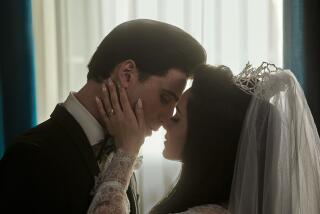An ‘Officer’ and a Rock ‘n’ Roll Legend : TV Film Shows How the King Let His Career Be Hijacked by Colonel Parker
- Share via
Elvis Presley died at age 42 in 1977, but TV has kept him alive with a seemingly endless stream of TV movies, miniseries, series and specials. Two days after what would have been his 58th birthday, NBC unveils its new Elvis movie, “Elvis & the Colonel: The Untold Story,” which dramatizes the stormy relationship between the rock ‘n’ roll legend and his longtime manager, Colonel Tom Parker.
Beau Bridges stars as the mysterious Parker, a former carnival barker who signs Presley (Rob Youngblood) when he is a young singer and takes him to the top of the profession. As the years pass, Parker (who is still alive) oversees Presley’s professional and personal lives and even manages the estate for several years after Presley’s death in 1977.
“Elvis and the Colonel” definitely shows the Colonel (the title was a moniker) in a less than flattering light. He is portrayed as a man with unsavory business practices who ruled Presley’s life with an iron fist and made bizarre career choices for his client, including turning down the leads in “West Side Story” and “A Star Is Born,” because he didn’t want Presley to play second fiddle to Natalie Wood and Barbra Streisand.
Dick Clark, the film’s executive producer, who also produced the high-rated 1979 movie “Elvis,” said he had long wanted to do a movie he believes is the true story of Presley and Parker, beyond the premise of “wasn’t the Colonel the greatest manager that ever came down the pike, which is what was put forth for so many years.”
According to Clark, Parker was anything but a great manager. When he signed the unknown Presley back in 1956, Parker received 25% of Presley’s income. In 1967, Clark said, he increased his take to 50%.
In addition, “As a result of agreements executed on March 1, 1973, Colonel Tom Parker sold Presley’s catalogue for half of the royalty rate of what any other major artist got,” Clark said. “He sold for $5 million all of Elvis Presley’s music and records to RCA. That meant Elvis got $1.25 million out of all of his catalogue. That body of work, I can’t even begin to know how many hundreds of millions of dollars it is worth.”
Clark believes Presley and Parker had a love-hate relationship. “I am sure neither character was all black nor white,” said Clark, who dealt with Parker a few times during Presley’s career. Presley, Clark said, “was not educated in contracts and so forth. Apparently, Elvis never read anything that was put in front of him. But he allowed it to happen, no doubt about it. He had full knowledge.”
The movie’s director, William C. Graham, also directed Presley in his last film, 1969’s “Change of Habit.” He recalled that Parker didn’t spend much time on the set. “Elvis and his friends, the so-called Memphis Mafia, they were like naughty boys,” said Graham, adding that Presley was one of the nicest men he ever met.
“They liked to play practical jokes and shoot water pistols at each other and me,” Graham said. “When the Colonel came on the set, he was sort of a truant officer. He always had a kind of serious grumpy expression on his face. The thing I observed was that Elvis had a lot of respect, almost fear, of the Colonel. But the Colonel stayed very much out of the shooting of the movie. He pretty much stuck to the business end of things.”
Beau Bridges, however, believes Parker did a lot for Presley. He admitted that while growing up in the ‘50s he was not a fan of Presley, preferring such artists as Little Richard and Chuck Berry. “I thought Elvis and some of the white singers were ripping off my heroes,” Bridges said. “I did grow to like him later on. I don’t think he was anywhere near one of the best singing in rock ‘n’ roll at the time. That’s why I feel the Colonel did have a lot do to with making him as huge a star as he was.”
Rob Youngblood, who plays Presley, said he feels the singer remained with Parker because the two hooked up so early in his career. “They were scared to death what would happen without the other one,” Youngblood said. “I think after a while he really lost touch and he relied so much on the Colonel to be his line on the outside world. He was afraid to be without him. Elvis was a very kind, giving, wonderful human. I think, in some respects, he felt bad turning the Colonel away.”
Ultimately, Clark said, Presley and Parker’s story is a very sad one. “I have always said if there were more people around (Elvis), rather than the parasites, who really loved him, he might have survived. But the Colonel convinced him he had to be a recluse, that he had to hide out. He kept Elvis captive. It is a very bizarre story.”
“Elvis & the Colonel: The Untold Story” airs Sunday at 9 p.m. on NBC.
More to Read
The complete guide to home viewing
Get Screen Gab for everything about the TV shows and streaming movies everyone’s talking about.
You may occasionally receive promotional content from the Los Angeles Times.







